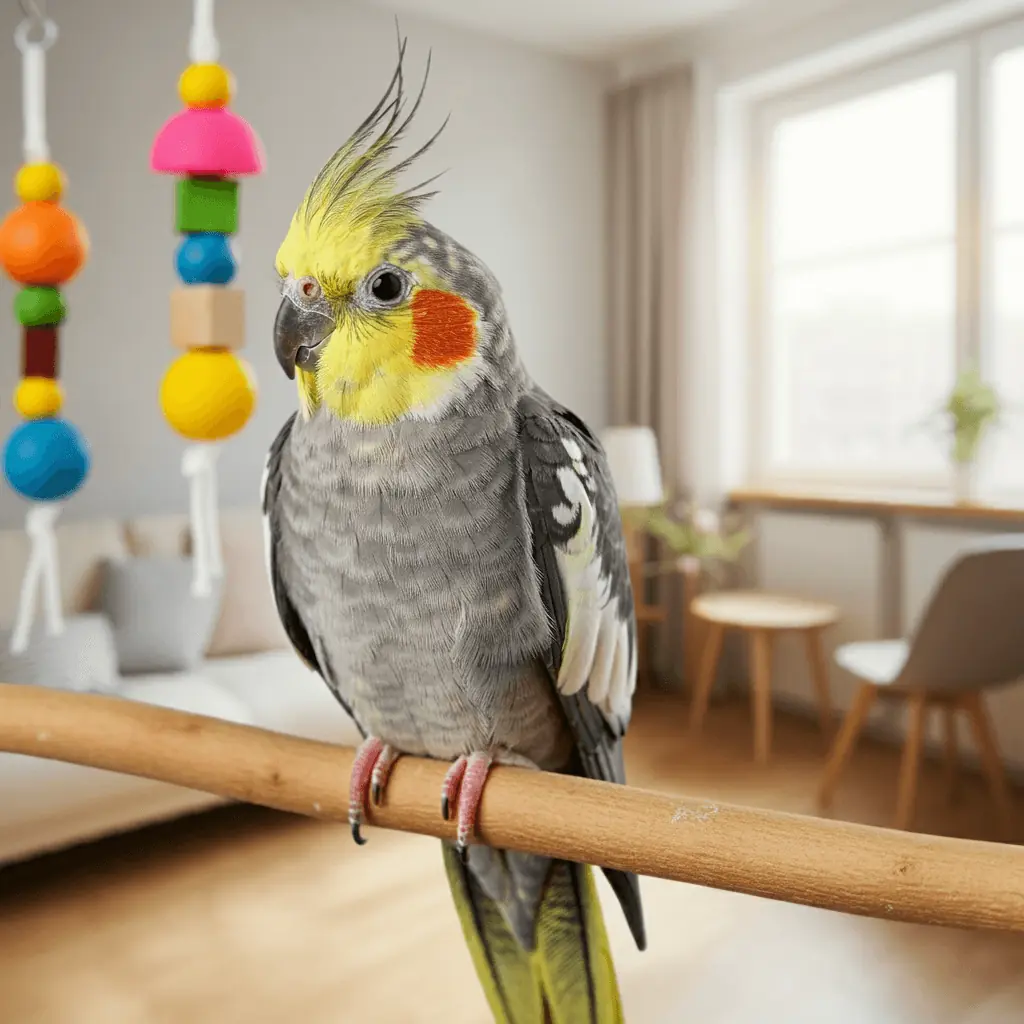Introduction
Caring for a cockatiel bird is both a rewarding and joyful experience, but it does come with its own set of responsibilities. Whether you’re a first-time bird owner or someone looking to improve your pet care routine, understanding how to care for a cockatiel bird is essential for keeping them happy and healthy. Cockatiels are known for their friendly nature and playful behavior, making them a popular choice for many households. However, like any pet, they require specific care to thrive.
In this guide, we’ll walk you through everything you need to know about cockatiel care, from providing the right diet to creating a stimulating environment. We’ll also cover common health issues and tips on how to bond with your bird, ensuring your cockatiel feels comfortable and loved.
By the end of this post, you’ll have a clear understanding of the essentials, including cockatiel grooming, feeding habits, and how to recognize signs of health problems. This guide is packed with actionable tips to help you provide the best care for your feathered friend.
Understanding Cockatiel Behavior and Personality
Cockatiels are known for their affectionate and playful personalities, making them one of the most popular pet birds. Understanding your cockatiel’s behavior is key to providing the care they need to stay healthy and happy. These birds thrive on social interaction, and they’re often described as gentle and friendly, though each cockatiel has its own unique temperament.
One thing that stands out about cockatiels is their love for attention. They enjoy spending time with their owners and are quick to bond with the people who care for them. You’ll often find your cockatiel whistling or chirping, which are signs of contentment. Some cockatiels even mimic sounds or simple words, showcasing their intelligence and ability to learn.
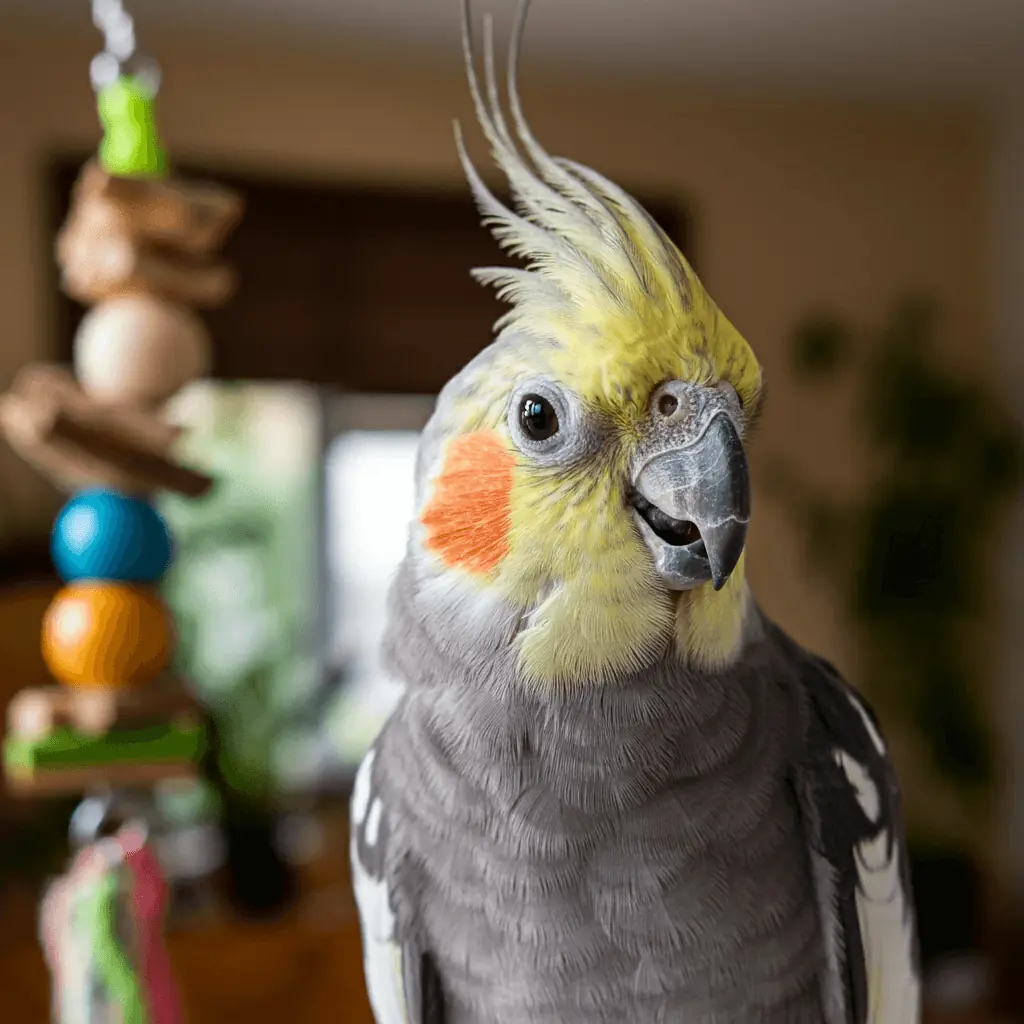
Capturing the melodious charm of a cockatiel singing in a lively home setting.
However, cockatiels can also exhibit behaviors that indicate discomfort or stress. For instance, if your bird is hissing or puffing up its feathers, it might be feeling threatened or scared. On the other hand, if it’s preening its feathers or spreading its wings, these are signs of relaxation and trust.
As you spend more time with your cockatiel, you’ll start to notice patterns in their behavior. It’s important to respond to their needs, whether it’s providing more social interaction or ensuring they have enough mental stimulation. A happy cockatiel will be active and engaged, while a stressed or bored bird might become lethargic or even aggressive.
Understanding cockatiel behavior is crucial to fostering a strong bond and creating a healthy living environment for your bird. With proper attention and care, your cockatiel will not only thrive but also become a beloved companion in your home.
Creating the Ideal Living Environment for Your Cockatiel
Setting up the perfect living environment is essential for your cockatiel’s overall well-being. A proper setup not only keeps your bird safe but also ensures it stays happy and mentally stimulated. When you know how to care for a cockatiel bird, providing the right environment becomes much easier.
Choosing the Right Cage
The cage is your cockatiel’s home, so picking the right one is crucial. Ideally, you want a cage that’s spacious enough for your bird to move around freely. Look for a cage that’s at least 24 inches wide and tall, with horizontal bars to allow your cockatiel to climb and explore. The spacing between the bars should be no more than ½ inch to prevent any accidental escapes or injuries.
Ensure the cage has a few natural wood perches, which are better for your cockatiel’s feet than plastic ones. Avoid overcrowding the cage with too many toys or accessories, as your bird needs room to stretch its wings and exercise.
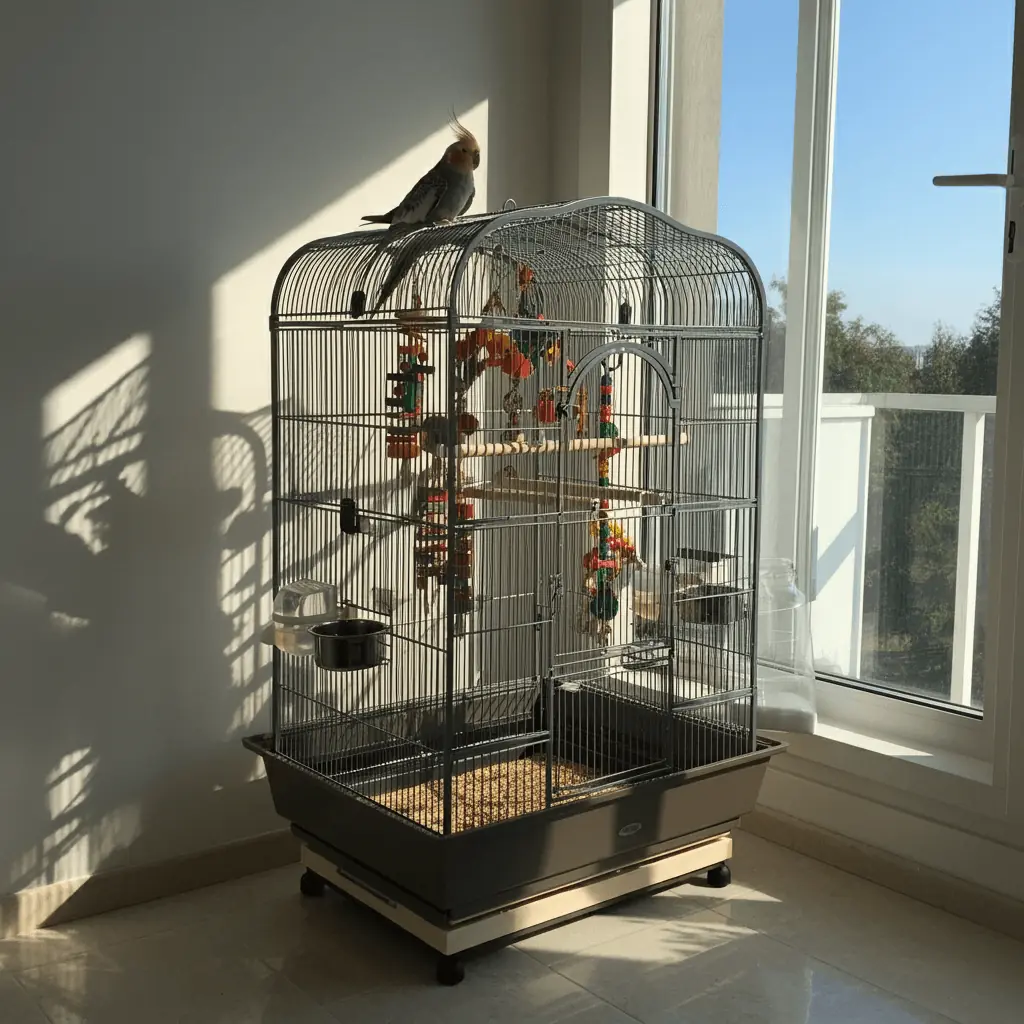
This cockatiel’s cage is a prime example of optimal living space with ample toys and perches.
Perches and Toys for Enrichment
Cockatiels are active birds, and they need both physical and mental stimulation to stay healthy. Offering a variety of perches with different textures and sizes helps keep their feet in good condition. Wooden perches are ideal, but make sure to include some made of rope or natural branches to vary the textures.
Toys are just as important for your cockatiel’s mental health. Rotate different toys regularly to keep your bird entertained. Puzzle toys, mirrors, and hanging ropes can all provide hours of enrichment. Just ensure the toys are bird-safe and don’t have any small parts that could be swallowed.
Placing the Cage in the Right Spot
Where you place your cockatiel’s cage can make a big difference in its comfort. Position the cage in a quiet but active area of your home, where your bird can feel part of the family without being overwhelmed by noise or movement. Cockatiels enjoy social interaction, but they also need time to rest, so avoid placing the cage near drafty windows or directly in the sun. A corner of the living room or a similar space where your bird can observe you without feeling exposed is ideal.
Keep it Clean and Comfortable
A clean environment is essential for your cockatiel’s health. Make sure to clean the cage tray regularly, and wash the perches and toys to prevent the build-up of dirt or bacteria. Fresh water should always be available, and food dishes should be washed daily. A tidy cage not only promotes good hygiene but also helps prevent potential health problems like respiratory issues.
Creating a safe and comfortable living space is a key part of caring for your cockatiel. With the right cage, enrichment, and environment, you’ll be ensuring your feathered friend thrives in your home.
Feeding Your Cockatiel: A Balanced Diet
Providing a balanced diet is one of the most important aspects of learning how to care for a cockatiel bird. A proper diet not only keeps your cockatiel healthy but also ensures it stays active and happy. Cockatiels, like many birds, need a mix of nutrients to thrive, and understanding what to feed them is key to their long-term health.
Essential Foods for Cockatiel Health
A well-balanced cockatiel diet should consist of high-quality seeds, pellets, fresh fruits, and vegetables. While seeds are often seen as a staple, they shouldn’t make up the entire diet. A mix of pellets provides essential vitamins and minerals that seeds alone can’t offer. Pellets should form about 60-70% of your cockatiel’s daily intake.
In addition to seeds and pellets, include fresh fruits and vegetables like apples, carrots, spinach, and broccoli. These provide vital nutrients and also offer variety, keeping your bird interested in its meals. Introduce new foods gradually, and monitor which ones your cockatiel enjoys.
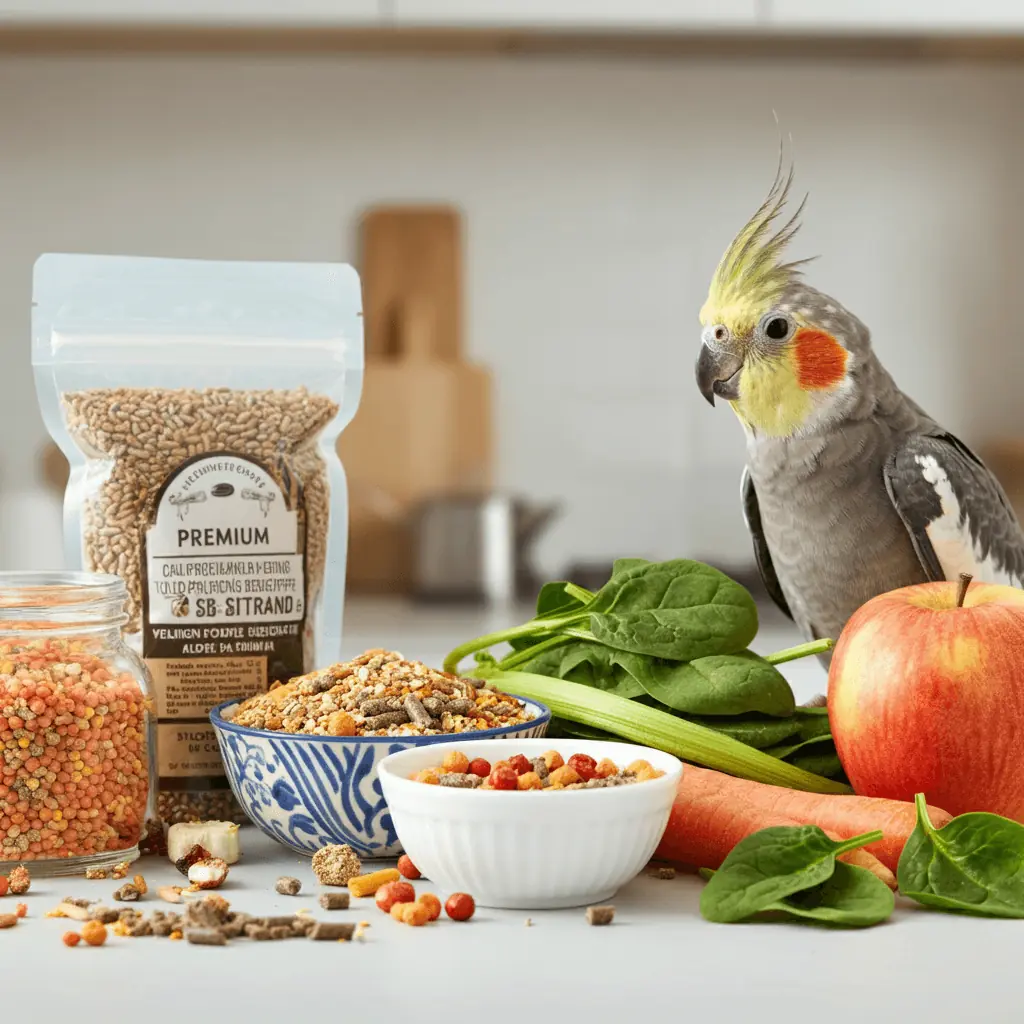
A cockatiel examines a spread of healthy food options, essential for its diet.
Foods to Avoid
While cockatiels can enjoy a range of foods, there are some that should be strictly avoided. Never feed your cockatiel avocado, chocolate, caffeine, alcohol, or salty foods, as these can be toxic and even fatal to birds. Additionally, avoid giving them processed foods or anything high in sugar or fat, as these can lead to obesity and other health problems.
It’s also important to avoid an all-seed diet. While cockatiels love seeds, relying on them exclusively can lead to nutrient deficiencies, particularly in vitamin A, calcium, and protein. Balance is key, so ensure your bird’s diet is varied.
Fresh Water and Supplements
Always provide your cockatiel with fresh, clean water. Change the water daily to prevent bacteria build-up, especially if your bird tends to drop food into the dish. In addition to water, you might consider offering cuttlebone or mineral blocks to ensure your cockatiel gets enough calcium, which is crucial for their beak and bone health.
If you’re unsure whether your cockatiel is getting all the necessary nutrients, you can consult your vet about supplements, but be cautious with over-supplementing, as it can sometimes do more harm than good.
Healthy Treats for Cockatiels
Treats can be a great way to bond with your cockatiel, but they should be given in moderation. Millet sprays are a favorite for most cockatiels and make for a great training tool. However, treats should make up no more than 10% of your cockatiel’s daily diet, to avoid overfeeding or disrupting their balanced nutrition.
Grooming and Hygiene for a Healthy Cockatiel
Maintaining proper grooming and hygiene is essential for keeping your cockatiel healthy and comfortable. Regular grooming helps prevent health issues, keeps your bird’s feathers in good condition, and ensures your cockatiel looks and feels its best. When you understand how to care for a cockatiel bird, grooming becomes a simple but important part of their overall well-being.
Bathing Your Cockatiel
Cockatiels love to keep their feathers clean, and offering them regular baths is a great way to support their natural grooming habits. Some cockatiels enjoy misting from a spray bottle, while others may prefer bathing in a shallow dish of lukewarm water. You can try both methods to see which your bird prefers. Let your cockatiel bathe at its own pace and always ensure the water is not too deep, to avoid accidents.
Bathing helps to remove dust, dirt, and loose feathers, keeping their plumage healthy and reducing the risk of skin irritation. Aim to offer a bath a couple of times a week, especially during molting periods when new feathers are growing in.
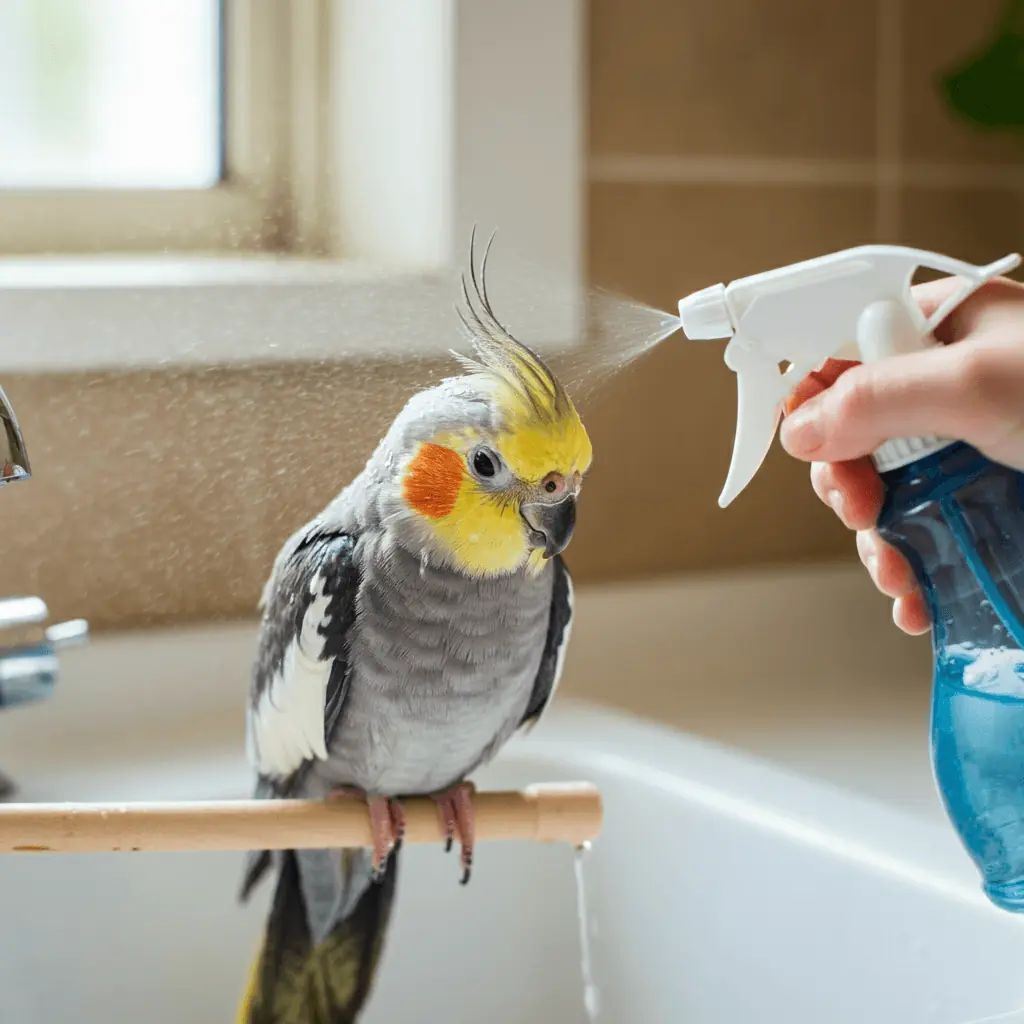
Regular mist baths keep this cockatiel’s feathers in top condition.
Clipping Nails and Trimming Feathers
Cockatiels, like all birds, need regular nail trimming to prevent overgrowth, which can make it difficult for them to perch comfortably. You can trim your cockatiel’s nails at home using bird-safe clippers, but if you’re unsure, it’s always a good idea to ask your vet or an avian groomer for help.
Wing clipping is another grooming consideration for some cockatiel owners. While not necessary for all birds, trimming a few feathers can limit flight and help prevent accidents indoors. It’s important to consult with your vet before clipping your bird’s wings, as improper clipping can harm your cockatiel.
Preening and Feather Care
Cockatiels naturally preen their feathers throughout the day, using their beaks to align their feathers and keep them in top condition. This is an important part of their self-care routine, and it’s your job to support it by providing a clean and healthy environment. Watch for any signs of excessive preening or feather plucking, which could indicate stress or health issues.
To help with preening, you can provide a cuttlebone or mineral block, which aids in beak health and encourages natural grooming habits.
Cleaning the Cage for Better Hygiene
Hygiene isn’t just about grooming your bird—it also involves keeping your cockatiel’s environment clean. Regularly clean the cage, changing the liner and washing the food and water dishes daily. Toys and perches should also be cleaned weekly to prevent the build-up of bacteria or droppings. A clean environment is key to avoiding respiratory issues and keeping your cockatiel in good health.
Keeping up with your cockatiel’s grooming and hygiene routine will ensure that your bird stays healthy, happy, and full of energy. With a little attention to detail, you can prevent common health problems and keep your cockatiel looking its best.
Training and Socialization: Building Trust with Your Cockatiel
Training and socializing your cockatiel are essential steps in building a strong bond and ensuring a well-adjusted pet. Cockatiels are intelligent birds that thrive on interaction and attention, and with the right approach, you can teach them simple commands while deepening your relationship. Knowing how to care for a cockatiel bird includes understanding how to engage them in ways that build trust and mutual respect.
Basic Commands and Tricks
Training your cockatiel doesn’t have to be complicated. Start with simple commands like “step up” and “step down.” These basic commands teach your bird to climb onto your hand or perch on command, making handling much easier. Be patient, as cockatiels may take time to adjust, but with consistent practice, they will begin to understand.
Use positive reinforcement when training. Offer small treats, like millet, as a reward when your cockatiel follows a command. Keep training sessions short, around 5-10 minutes, to prevent your bird from getting tired or frustrated. Over time, you can teach them more advanced tricks, like mimicking sounds or even whistling a tune.
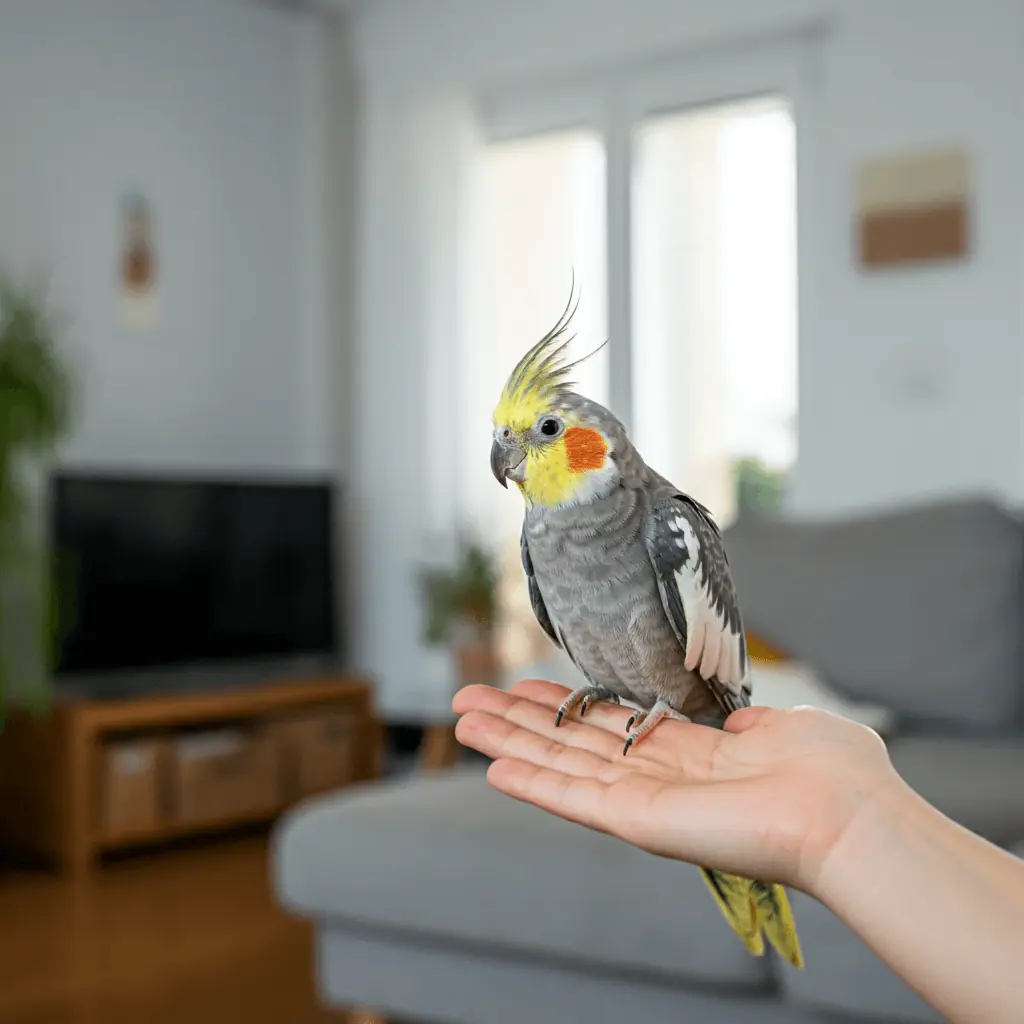
Effective training techniques allow this cockatiel to confidently step up onto a hand.
Socializing Your Cockatiel
Cockatiels are social creatures and benefit greatly from regular interaction. To build trust, spend time near their cage and talk to them softly. Gradually, they will become more comfortable with your presence. If your cockatiel is new to your home, give them time to adjust to their surroundings before trying to handle them.
Socialization isn’t just about spending time with your bird, though. It’s also about introducing them to new experiences, like different toys, environments, or even other pets (safely and under supervision). The more your cockatiel is exposed to, the more confident they will become.
How to Handle a Shy Cockatiel
If your cockatiel is shy or nervous, don’t rush the process. Building trust with a cockatiel takes time, especially if they have been previously neglected or rehomed. Start by offering treats from your hand while allowing your bird to stay in the safety of its cage. Once they’re comfortable taking food from your hand, you can gradually introduce more physical contact, like gentle petting or encouraging them to step onto your finger.
Patience is key here. Never force your cockatiel to interact if they’re showing signs of fear, like hissing, biting, or retreating. Over time, your bird will associate you with positive experiences, leading to a deeper level of trust and comfort.
Building Long-Term Trust
Trust is built through consistent, gentle handling and social interaction. Make sure to spend time with your cockatiel every day, even if it’s just sitting nearby and talking to them. This daily interaction helps reinforce the bond and ensures your cockatiel feels safe and secure in your care.
Training and socialization not only help build trust but also improve your cockatiel’s mental and emotional health. A well-trained, socialized cockatiel is happier, more confident, and more likely to engage with you on a deeper level.
Recognizing Signs of Health Problems in Cockatiels
As a responsible cockatiel owner, it’s important to keep an eye on your bird’s health. Cockatiels can be good at hiding signs of illness, so knowing how to spot potential health problems early is key to ensuring their well-being. When learning how to care for a cockatiel bird, understanding their behavior and physical condition helps you quickly notice when something’s wrong.
Common Health Issues and Their Symptoms
Cockatiels are generally hardy birds, but like all pets, they are susceptible to certain health issues. Some of the most common health problems include respiratory infections, feather plucking, and digestive issues. Each of these conditions comes with noticeable signs that every cockatiel owner should be aware of.
- Lethargy and Fluffed-Up Feathers
If your cockatiel is sitting with its feathers puffed up for long periods or seems unusually tired, this could be a sign of illness. Healthy cockatiels are active and alert, so any change in energy levels should be taken seriously. - Loss of Appetite
A cockatiel that suddenly stops eating or drinking may be experiencing an internal health problem. Loss of appetite can be related to a number of issues, from infections to digestive problems, and should prompt a visit to the vet. - Changes in Droppings
Monitoring your cockatiel’s droppings can provide insight into its health. If you notice a change in color, consistency, or frequency, this may signal digestive or kidney issues. Normal cockatiel droppings should be firm and green, with white urates and minimal odor. - Respiratory Issues
Signs of respiratory problems include sneezing, nasal discharge, wheezing, or difficulty breathing. If you notice these symptoms, it’s crucial to seek veterinary care quickly, as respiratory infections can become serious if untreated. - Feather Plucking or Excessive Preening
While preening is a normal grooming behavior, excessive preening or feather plucking could indicate stress, boredom, or skin irritation. Feather plucking can also be a sign of underlying medical issues such as parasites or infections.
When to Visit the Vet
It’s always better to be safe than sorry when it comes to your cockatiel’s health. If your bird shows any of the above symptoms, or if something just feels off, schedule a visit to an avian vet. Birds tend to hide their illnesses until they are quite advanced, so early intervention is crucial for recovery.
A vet can conduct a physical examination, perform tests, and offer advice on how to address health concerns. Regular vet check-ups are also a good idea, even when your cockatiel seems healthy, as they can help identify issues before they become serious.
Preventing Health Issues
Preventing health problems starts with providing a balanced diet, a clean living environment, and plenty of mental and physical stimulation. Regular cage cleaning, fresh food and water, and an enriching setup with toys and perches all contribute to your cockatiel’s overall health. Keeping an eye on your bird’s behavior and physical condition can go a long way in preventing minor issues from becoming major health problems.
By recognizing signs of health issues early and taking action, you’ll help ensure your cockatiel stays healthy and enjoys a long, happy life.
Providing Mental Stimulation and Playtime for Your Cockatiel
Cockatiels are highly intelligent and active birds that thrive on interaction and mental stimulation. Without proper engagement, they can become bored, stressed, or even develop behavioral issues like feather plucking. Learning how to care for a cockatiel bird involves not only meeting their basic needs but also keeping them mentally and physically active. A happy, engaged cockatiel is a healthy cockatiel.
Importance of Mental Stimulation
Just like humans, cockatiels need regular mental stimulation to stay sharp and content. In the wild, they spend their days exploring, foraging for food, and interacting with their flock. Captive cockatiels need similar challenges to keep their minds engaged. Providing toys, interactive activities, and opportunities for exploration can help prevent boredom and keep your bird entertained.
Choosing the Right Toys
Toys are a great way to keep your cockatiel mentally stimulated. Look for toys that encourage problem-solving, like puzzle toys, foraging toys, or toys with hidden treats inside. Cockatiels also enjoy toys that they can chew on, such as wood or rope toys, which help satisfy their natural chewing instincts.
Rotate the toys regularly to keep things fresh. Cockatiels can lose interest if they have the same toys day in and day out. Introducing new toys or rearranging the setup in their cage can make their environment feel new and exciting, keeping them engaged and curious.
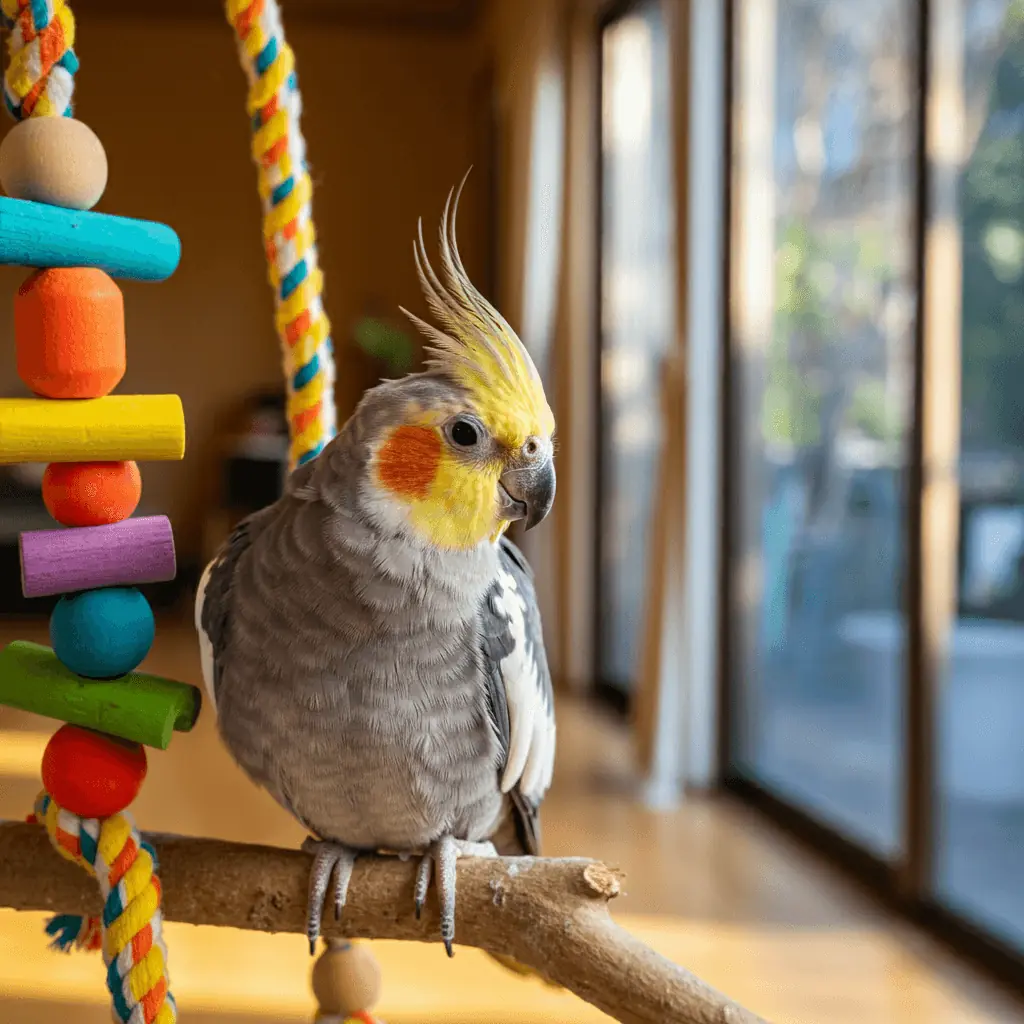
Mental stimulation through play is vital for this cockatiel’s overall well-being.
Playtime Outside the Cage
While toys are important, nothing beats interactive playtime outside the cage. Letting your cockatiel out for supervised free flight or exploration gives them a chance to stretch their wings and exercise their muscles. It’s also a great time to bond with your bird through gentle handling or teaching them new tricks.
When your cockatiel is out of the cage, provide safe spaces where they can explore. Set up a play area with perches, climbing ropes, and bird-safe toys to encourage physical activity and discovery. This not only helps with mental stimulation but also promotes better physical health.
Social Interaction
Cockatiels are social birds, and they thrive on interaction with their human companions. Spending time talking, whistling, or simply sitting with your cockatiel can go a long way in keeping them happy. Birds that receive regular attention are more likely to form strong bonds and exhibit positive behavior.
If you have the time, teach your cockatiel tricks or simple commands during playtime. Not only does this strengthen your relationship, but it also provides the mental challenge that cockatiels need to stay sharp.
Signs Your Cockatiel Needs More Stimulation
It’s important to recognize when your cockatiel may not be getting enough mental or physical activity. Signs of boredom or frustration can include excessive vocalization, feather plucking, or destructive behavior like chewing on the cage bars. If you notice these signs, it’s time to introduce more enrichment through new toys, more social interaction, or increased out-of-cage time.
Balancing Play and Rest
While it’s important to provide regular mental stimulation, your cockatiel also needs time to rest. Make sure your bird has a quiet space to retreat to when they need downtime, as too much stimulation can lead to stress. Finding the right balance between active play and relaxation is key to your bird’s overall happiness.
Providing mental stimulation and playtime is essential for your cockatiel’s health and well-being. By keeping your bird mentally engaged, physically active, and socially connected, you’ll help ensure a long and happy life for your feathered friend.
Frequently Asked Questions (FAQs)
When it comes to knowing how to care for a cockatiel bird, many new owners have questions. Here are some of the most commonly asked questions, along with helpful answers to guide you in providing the best care for your feathered friend.
1. How often should I clean my cockatiel’s cage?
It’s important to clean your cockatiel’s cage regularly to maintain a healthy environment. Ideally, you should replace the cage liner daily, clean food and water dishes every day, and give the cage a thorough cleaning at least once a week. This helps prevent the build-up of bacteria, mold, and droppings, which can lead to health problems.
2. Can cockatiels learn to talk?
Yes, cockatiels can learn to mimic sounds and sometimes words, though they aren’t as vocal as some larger parrots. Male cockatiels are usually better at mimicking sounds than females. With patience and repetition, you may be able to teach your cockatiel to say simple words or whistles.
3. What is the best diet for a cockatiel?
A balanced diet for a cockatiel includes a mix of high-quality pellets, seeds, fresh fruits, and vegetables. Pellets should make up the majority of their diet, around 60-70%, as they provide essential vitamins and nutrients. Fresh produce like apples, carrots, spinach, and broccoli should be offered daily. Avoid an all-seed diet, as it can lead to nutrient deficiencies.
4. How much time should I spend with my cockatiel each day?
Cockatiels are social birds and need interaction with their human companions. Aim to spend at least an hour or two each day with your cockatiel, whether through play, training, or simply sitting with them. This helps strengthen the bond and keeps your bird happy and mentally stimulated.
5. Do cockatiels need regular vet check-ups?
Yes, just like any other pet, cockatiels should have regular check-ups with an avian vet. Annual visits are recommended to monitor their health and catch any potential issues early. If you notice changes in your bird’s behavior, appetite, or droppings, don’t wait for a check-up—schedule a vet visit as soon as possible.
6. Why is my cockatiel biting me?
Cockatiels may bite for several reasons, including fear, stress, or territorial behavior. If your bird is new to your home, it might need time to adjust. Alternatively, your cockatiel may bite if it feels threatened or overstimulated. Building trust through gentle handling and positive reinforcement can help reduce biting over time.
7. How can I tell if my cockatiel is sick?
Cockatiels can hide illness well, so it’s important to watch for subtle signs of health problems. Common indicators of illness include lethargy, puffed-up feathers, loss of appetite, changes in droppings, and respiratory issues like wheezing or sneezing. If you notice any of these signs, it’s important to visit an avian vet immediately.
8. Do cockatiels need a companion bird?
Cockatiels are social and enjoy interaction, but they don’t necessarily need another bird as a companion if you’re able to give them enough attention. However, if you’re away from home often or can’t spend as much time with your cockatiel, having a second bird may help prevent loneliness and boredom.
Conclusion
Caring for a cockatiel bird requires a combination of attention, knowledge, and dedication. By providing a balanced diet, regular grooming, and a stimulating environment, you’ll ensure that your cockatiel stays healthy and happy. Understanding their behavior and building trust through socialization and playtime will strengthen your bond, making them a joyful companion in your life.
Recognizing early signs of health problems and staying on top of their hygiene will help prevent common issues, while regular vet check-ups ensure your bird’s long-term well-being. As you continue to learn how to care for a cockatiel bird, you’ll discover that these intelligent, affectionate creatures bring immense value and joy to your home.
By following the tips in this guide, you’ll be well-equipped to create the ideal living environment for your cockatiel and offer them the best possible care. A happy cockatiel is not just a pet, but a friend that thrives with the love and attention you provide.

